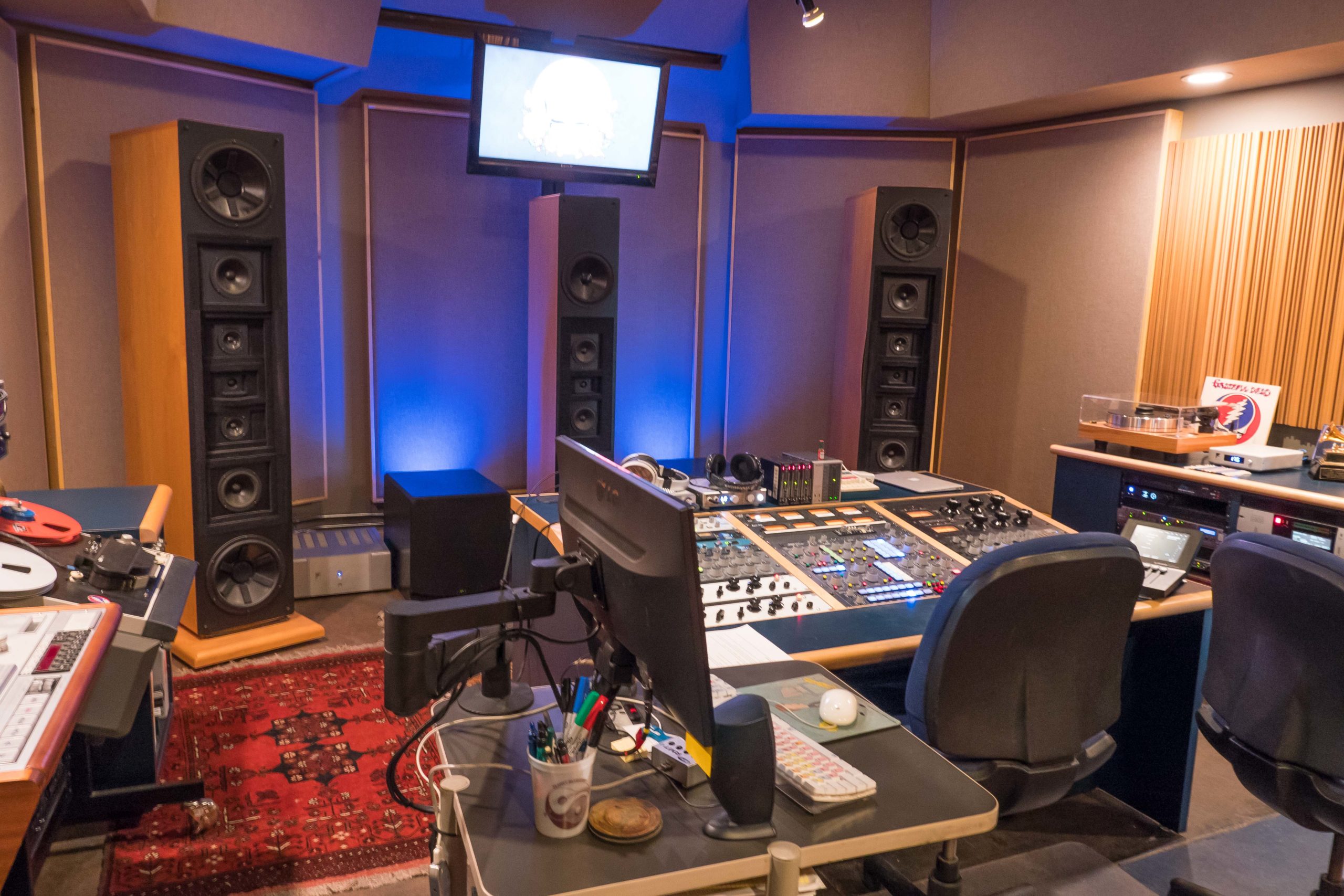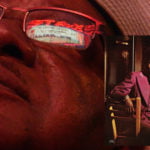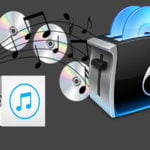It’s the time of year for saving money!
Yesterday afternoon a friend and I made our way through 5:00 rush-hour traffic to attend a listening session arranged by David Glasser, at his Airshow mastering facility in the foothills outside of Boulder Colorado. Airshow used to be located in the city of Boulder, but last year David decided to build a brand new mastering room from scratch on his property, ten minutes outside of town.
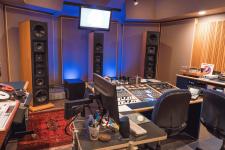 The finished studio’s overall size is smaller than his previous digs, but not by much. Also since the new studio was built from scratch and designed from the ground up by Sam Berkow, who designed his previous one and also was responsible for the design at Boulder’s E-Town Hall, it is a better, more “dialed in” space than David’s previous one. One thing that did not change in the new studio was the choice of main loudspeakers. David kept his Dunlavy SC-V loudspeakers that he has been using for the last 20 years.
The finished studio’s overall size is smaller than his previous digs, but not by much. Also since the new studio was built from scratch and designed from the ground up by Sam Berkow, who designed his previous one and also was responsible for the design at Boulder’s E-Town Hall, it is a better, more “dialed in” space than David’s previous one. One thing that did not change in the new studio was the choice of main loudspeakers. David kept his Dunlavy SC-V loudspeakers that he has been using for the last 20 years.
The reason for my trip to Boulder’s hinterlands was to attend an “MQA Listening Session.” Airshow is now MQA-equipped, so that if a client requests Airshow can now prepare a master and specify the parameters for MQA encoding. To do this Airshow added two new additions to their production chain, a Mytek Brooklyn DAC and a plug-in for the SoundBlade mastering software that lets David and engineer Anna Frick preview, listen to, and select which MQA filters and settings for the encoding process. The actual encoding is done by MQA, but the plug-in allows David to specify the settings and listen to them, real-time. It also allows for a direct, real-time A/B comparisons of the original file and MQA-encoded versions of that file.
The Mytek Brooklyn also has a toggle that lets you go from decoded MQA to undecoded MQA for comparison. So, Airshow now has two ways to compare MQA files – via the Soundbade plug-in and via the Mytek Brooklyn. During our listening sessions we used both.
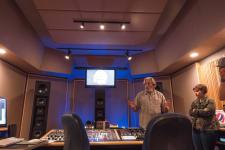
This was a group listening session. There were approximately fifteen listeners present during the session, which lasted about 1 ½ hours. Given the nature of the “sweet spot” where the imaging and harmonic balance are ideal, which at airshow was the “mastering engineer’s seat” at the center of the console, only a few listeners could be in that spot at one time. Since I have done substantial amounts of A/B’ing MQA and non-MQA files on my own system, with my own recorded material that I knew well, I let others who had not had the opportunity to do a controlled A/B spend time in the prime positions while I remained at the center (hey, a guy’s gotta have imaging) near the back of the room.
After each A/B session listeners made comments. Most heard some differences between the MQA and original tracks, but in every case those differences were small and with some tracks over half the commenters felt the MQA track offered some improvements over the original masters in terms of listening ease and harmonic balance.
In my own A/B testing, with my own gear, on my own tracks, in my own room, I noticed that most of the differences I heard between MQA and non-MQA tracks were in areas of imaging, soundstaging, and micro-dynamics, not harmonic balance. I did not expect that most of the listeners (all of whom are recording pros) would comment upon harmonic variations between tracks as the primary difference they heard. At my purposely less than ideal listening position I heard very little difference between the original masters and the MQA versions. The only time I heard what I would term a “robust” i.e. repeatable difference that I would be willing to stand by in a blind A/B test, was when we compared the MQA version of a live Grateful Dead track with the undecoded version. The un-decoded MQA file had a rougher, less refined upper midrange that made the whole recording sound less musical.
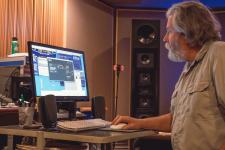
On the comparisons between 192/24 master files and the MQA’d versions I could not reliably tell a difference between them. Because of where I was sitting, during much of the A/B I could not determine whether I was listening to the MQA or the master because David had his back to me, so when he switched from one file to the other and announced the switch I could not see or hear which was which, so for me this was truly a “blind” comparison. And during my blind comparison I did not hear any differences between tracks except during the MQA decoded verses undecoded test where the differences were, for me, obvious.
My takeaway from this listening session was that at its worst MQA is at least on a par with the original master. And in a less than ideal listening position the subtle differences between MQA and an original master were obscured to the point that I am not at all surprised that some audio journalists have not heard any improvements or differences between MQA and non-MQA files during group listening sessions conducted at shows using commercial recordings.
While some audiophiles see MQA as a sonic step sideways with little offered in the way of universal sonic improvements by the encoding and decoding process, I feel they are missing the point of MQA, which is to simplify the playback process for ALL end-users. MQA is about giving everyone access to studio quality or near studio quality recordings on readily-available consumer devices – smart phones via streaming.
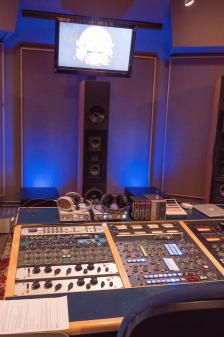 For me the last part of the MQA paradigm has yet to arrive – the smartphone app that can decode MQA files. The Tidal “desktop app” for computers already has first-stage MQA decoding built in, but I am still waiting for the IOS Tidal app that supports MQA decoding. For me that will be the last step that needs to happen before MQA can be called a complete and functional system. MQA contrarians will tell you that MQA offers nothing that is not already available IF you chose just the right combination of hardware and software, but that is not the same as having a universally available methodology that does not require a highly sophisticated user to implement correctly…
For me the last part of the MQA paradigm has yet to arrive – the smartphone app that can decode MQA files. The Tidal “desktop app” for computers already has first-stage MQA decoding built in, but I am still waiting for the IOS Tidal app that supports MQA decoding. For me that will be the last step that needs to happen before MQA can be called a complete and functional system. MQA contrarians will tell you that MQA offers nothing that is not already available IF you chose just the right combination of hardware and software, but that is not the same as having a universally available methodology that does not require a highly sophisticated user to implement correctly…
My visit to Airshow may not have been a slam-dunk for the universally improved quality of MQA-encoded files, but it did show that on the production side, MQA is now ready for prime time. Mastering studios, once MQA-equipped, can now produce MQA files that have been compared to the originals and configured with artist or studio-approved filter settings for public consumption. High-resolution streaming is almost within my smartphone’s grasp, almost…
